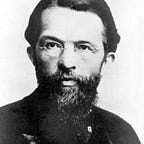Crusoe, morality, and axiomatic libertarianism
Imagine Robinson Crusoe survives a shipwreck and reaches an island in a rowboat. He discovers the island is full of hungry tigers. He can’t even step foot on the island for he would be attacked. Does Robinson have any rights on this island? He does not. In this situation, the concept has no meaning.
Robinson takes off and after a day of rowing he finds another island, where he discovers that one man lives. Does Robinson have any rights on this island? Does the other man have to treat Robinson with respect because they are both human? No, he does not. They will either cooperate or not, and live with the consequences.
Robinson doesn't like the company of the other man and he decides to try for yet another island. After two days of rowing he finds a big island. With no tigers or humans in sight, he starts working, saving, and investing in fishing tools.
After a few months he has a decent fishing operation going, and he decides to explore the island, so that he may get some variety in his diet.
After many hours, he is surprised to come across a straight row of fruit-bearing trees and a wooden shovel under one of them. He picks up the shovel to take a closer look when he hears “Stop!”. A man appears who says: “I am Roger the Beekeeper. I’m a specialist in bees and other insects. You can’t take that shovel. It’s in use by Paul, the farmer. I’m visiting him because he got injured during work.”
Robinson agrees to not take the shovel and to regard it as Paul’s. Robinson tells them about his fishing operation and they start trading and are better off than they otherwise would be. Does Robinson now have rights?
The three men have an understanding of the value of treating each other as producers with whom they can engage in the division of labor.
If Paul were to take Robinson’s fishing equipment without his permission, then there is now a third person whose opinion also matters. Roger realizes that if Paul takes Robinson’s production materials, then Roger himself will be worse off in the future. So he regards it as wrong, as far as interaction within the island society goes, for one member to expropriate goods from another member. And because of this, he will side with Robinson in such a dispute.
If that understanding is developed enough, and thus the social pressure is strong enough to generally prevent these things from happening, then Robinson can be said to enjoy property rights.
Right and wrong are applications of an interpersonal code of conduct:
- Individuals have a preference for a code of conduct, meaning what they think is acceptable and unacceptable behavior of the other members of their society. So an individual can meaningfully say: “I think X is wrong”.
- Within a society exists also a dominant code of conduct: that which in practice is accepted and not accepted between the societal members. So one could say “X is wrong”, and be referring to it.
- It can also be meaningful to make statements about which code of conduct leads to certain outcomes. One could say: “Code of conduct X is the foremost means to nearly everyone’s ends, in the long run”.
It is however not meaningful to make statements about the appropriateness of a code of conduct without referring to any of these three things; namely to state that a certain code of conduct must be followed without referring to anyone’s ends, or the consequences of their means.
If, for example, Robinson, Paul and Roger all preferred a life of survival of the fittest, understanding fully its economic consequences, how could we say that this would be morally wrong?
It is also possible that the three men had a bad understanding of economics and wrongly concluded that life without society would be more lush. But to tell them that their actions were morally wrong wouldn't change their behavior because they were doing what they thought lead them to their ends. Only in persuading them of a different economic thinking could their behavior be changed.
There are libertarians who think of the non-aggression principle of person and property as an axiom, and apply it that way. But without understanding its purpose it cannot be properly defended (as elaborated above), nor can it be properly applied. For example, what is a person and what is property?
The axiomatic view may lead one to conclude that from the moment of conception, there is a ‘person’ who ought to be treated with the same rights as any other person. However, right after conception, this being is incapable of rational thought and of purposeful action. It knows no people, and has no conception of the world. If person-hood is understood to be derived from the economic advantage of the division of labor, then we can see that the capacity of (human) beings to partake in it can vary. Children have part of the capacity for it and are learning to acquire it fully, and they already have complex personalized interactions with their environment. A fertilized egg however has none of those capabilities.
The axiomatic view may lead one to conclude that ‘property’ ought to remain property if it is traded for, until death and beyond (through inheritance). But when it is understood that the concept of property is adopted in society for a reason, then we can see how the strength of property rights in goods can vary. For example, if a plot of productively used land was traded for, and was subsequently left utterly unused for two decades, then the societal opinion may side with the ownership right of a new developer wanting to move in, such that the previous owner is compelled to sell at a low price, for fear of losing it altogether.
